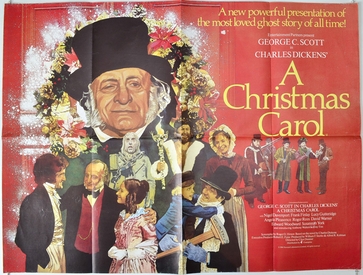So Far, The Truest Film Adaptation
Of Dickens' Classic Christmas Tale
 - If there is one book that is not short on screen adaptations, it is Charles Dickens' A Christmas Carol. Opinions will differ far and wide as to which film version of Dickens' tale is the best but there is little doubt in my mind that, as far as to-the-"T"-adaptations go, no other feature film version of Dickens' tale is as true to the original story than the 1984 TV movie A Christmas Carol starring George C. Scott.
- If there is one book that is not short on screen adaptations, it is Charles Dickens' A Christmas Carol. Opinions will differ far and wide as to which film version of Dickens' tale is the best but there is little doubt in my mind that, as far as to-the-"T"-adaptations go, no other feature film version of Dickens' tale is as true to the original story than the 1984 TV movie A Christmas Carol starring George C. Scott.I would not say that film begins and ends with starring actor George C. Scott; but Scott is a crucial part of the success of the film. Scott is an excellent Ebenezer Scrooge. With a terrific mix of the sarcasm, malice and curmudgeonness that we have all come to expect in a silver screen Scrooge, Scott brings Scrooge to life with other key components not always seen with other screen Scrooges: pain and confliction. Sometimes Scrooge's outlook on life and his fellow man is not explored in the slightest on film. Too many screen adaptations ignore why Scrooge behaves the way he does and do not show a development from "humbug" to Scrooge's redemption; the audience is simply expected to go along with it all. However, this 1984 TV adaptation clearly shows why Ebenezer Scrooge lives his life the way that he does and how his redemption progresses. As portrayed by George C. Scott, every "humbug" is birthed out of the anger and pain that Scrooge has carried around for years as a result of inescapable circumstances and personal choices he has made in the past. However, once Scrooge is presented with his life's story again first hand, he becomes conflicted, with the good man and humbug battling it out inside of him. This development of the Scrooge character through Scott's performance and good writing is unparalleled by other screen adaptations of A Christmas Carol, separating Scott's Scrooge from the rest as more than just a flat bah-humbug.
The icing on the cake comes in the form of a good film for Scott to perform within. A solid supporting cast - with such reliable and familiar faces as David Warner and Roger Rees; easily my pick for the best screen incarnations of Bob Cratchit and Fred Hollywell, respectively - add acting color around Scott's vibrant performance. The film itself is expertly packaged by director Clive Donner ( director of What's New Pussycat (1965) and the editor of another A Christmas Carol adaptation: Scrooge (1951)). Packed with generally engaging scenes, many of which have yet to be bested when compared to the many other Christmas Carol films, and featuring a crisp picture, this 1984 adaptation of A Christmas Carol is impressive as an overall film outside of the context of Scott's brilliant, scene-making performance.
I have seen a lot of screen versions of A Christmas Carol and none of them have made a stronger impact on me through the Scrooge character and adherence to Dickens than this 1984 television movie. But 1984's A Christmas Carol is not only the best screen production of Dickens' A Christmas Carol, it is one of the best TV movies ever made - all the same, it makes for an excellent yearly viewing at Christmastime.
CBC Rating: 9/10









